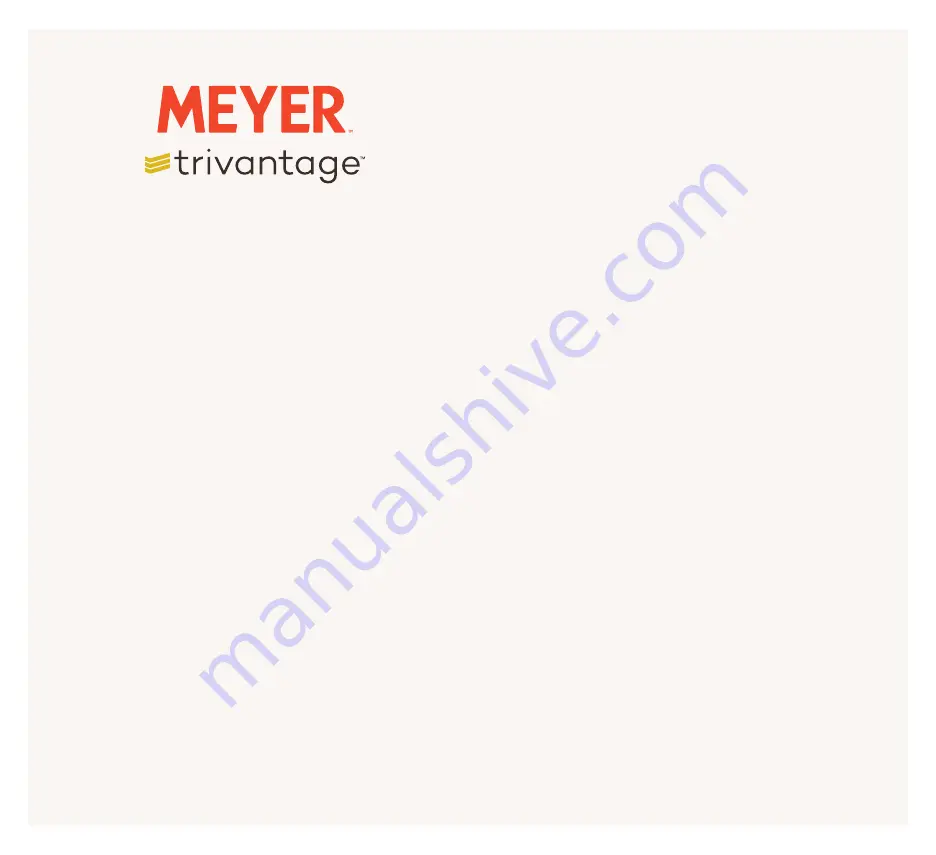
COOKING UTENSILS
Although minor scratches will not impair the performance of the
cookware, the use of sharp-edged metal utensils such as forks,
knives or whisks is not recommended. Please note scratches
are not covered under warranty.
EFFICIENT HEAT CONTROL
To some extent, cooking successfully depends on efficient heat
control. Do take some time out to experiment with your new
cookware. Learn the temperature settings on your cooker and
see how the cookware responds to the changes in heat level.
OVEN COOKING
Meyer TRIVANTAGE cookware is oven-safe up to 400°F/ 204°C/
Gas Mark 6. This means you can start a dish on top of the stove
and finish cooking it in the oven without having to change cookware.
Thank you for choosing Meyer TRIVANTAGE Cookware.
To ensure safety and durability, all cookware have been vigorously
tested at all stages of production and are manufactured to extremely
high standards using the best materials available.
A properly cared for MEYER TRIVANTAGE cookware will give you
years of cooking enjoyment.
Please read through these instructions carefully to learn about how
best to use and care for your new cookware.
BEFORE FIRST USE
STOVE-TOP COOKING
The special heat conductive design helps to spread heat quickly and
evenly, eliminating hot spots which can burn food. It is important to
maintain uniform heat distribution so that when food is added, it is
sealed almost instantly to reduce sticking.
Use low to medium heat. Continuous high heat causes most foods
to stick to the cookware and discolor the stainless steel. Tests have
shown that moderate heat produces the best results especially when
frying. The excellent heat conduction of the cookware means that
even low heat can be used to maintain even heating. Before frying,
preheat the cookware over moderate heat for about 2 to 3 minutes.
This ensures a more consistent temperature during the cooking cycle.
And add enough oil to just cover the cooking surface. Add food and fry
as you normally would.
For best results, choose a burner that is slightly smaller than the
base of the cookware. When using gas, adjust the flame so it does
not extend up the sides of the cookware. To avoid staining, do not
use high heat and wash cookware thoroughly after it has cooled
down.
Before using the first time, remove all labels. Wash the cookware
(and lid if included with purchase) in hot soapy water. Then rinse
thoroughly and let dry.
USING LIDS
(Not all items have lids - any references to lids apply only when
they are supplied with the product.)
Use a lid when cooking (except when deep frying). The lid
helps to seal in valuable nutrients and flavor during cooking and
at the same time reduces condensation in the kitchen. Cooking
with the lid on not only self-bastes the food by recirculating
moisture, but also helps to hold in heat, so food cooks faster
using less gas or electricity. With the lid preventing spattering, the
stove stays cleaner too.
• When boiling or steaming, remember to lower the heat once
boiling point is reached. A rattling lid is an indication of excessive
heat, which is simply wasted.
• Check during long periods of cooking that the water or liquid
has not boiled dry. When steaming, always replenish with hot
water.
• Do not leave cooking unattended for long periods. Even with the
lid on, it is possible for the contents to boil dry.
• Wash lid thoroughly after each use. Do not allow food particles
to accumulate around the glass rim. To keep the lid bright and
shiny, avoid using harsh abrasives or scouring pads.
SAFETY, USE & CARE INFORMATION
Your cookware is suitable for use on all conventional cooker
types including induction.


